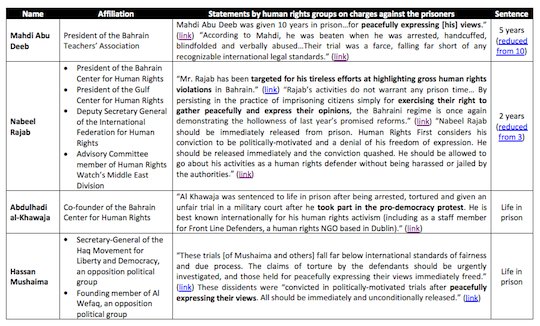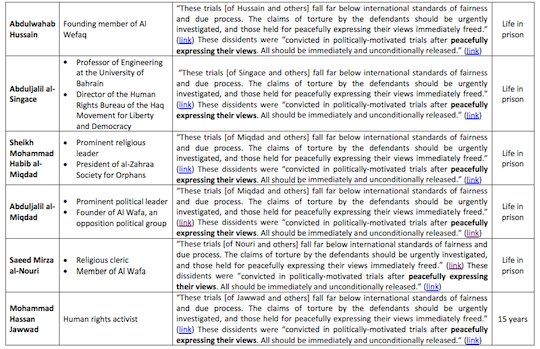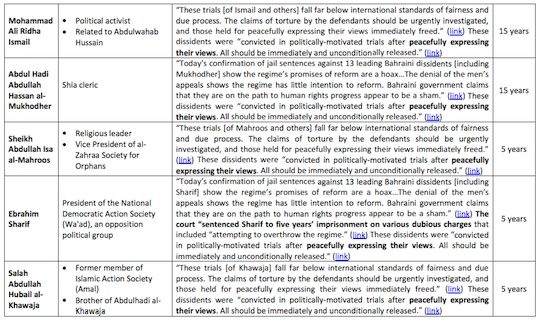[The following letter was issued by the undersigned group of human rights organizations on 10 April 2013.]
Dear driver:
In light of your participation in the upcoming Formula One race in Bahrain, we are writing to bring your attention to the ongoing human rights abuses and the more than one dozen prisoners of conscience currently detained in Bahrain, and to ask you to publicly support the Bahraini people in their peaceful calls for justice, freedom, and basic human rights.
As you may know, in February 2011, thousands of Bahraini protestors took to the streets to peacefully call for political reforms, taking part in a broader movement for democracy and dignity in the Middle East. In response, the Bahrain government began a concerted effort to repress demonstrators, arrest and detain activists, and persecute doctors who attempted to treat wounded protesters. Detainees were tortured in detention and forced to make false confessions. Hundreds were accused of “crimes” for having exercised their rights to free speech and assembly, and were subsequently subjected to unfair trials before military courts. Many of the most prominent and outspoken voices for reform and human rights were condemned to punishments as severe as life in prison.
More than two years later, these voices for reform have had their prison sentences upheld by Bahrain’s highest court and remain imprisoned. Meanwhile, stability and security in the country continues to deteriorate as peaceful protesters are arbitrarily arrested and detained, denied their due process rights, and subjected to brutal force by police. Although Bahrain’s prisoners of conscience have been denied their freedom, their morale is lifted and spirits are strengthened by messages from people around the world supporting Bahrainis “in their struggle to build a future of justice, freedom, democracy, and human rights.”
We recognize the importance of the Formula One race in the sport of racing, and we respect your decision to participate in the race. But as a public figure, we urge you to pledge your support for a free and just Bahrain, as public figures have done in support of this and other human rights issues in the past. Such support could be expressed during an interview at the Bahrain Grand Prix, in a statement published on your website, or in a Tweet. You could also publicly dedicate your race to one of the many prisoners of conscience held under lock and key for exercising their rights to free speech, expression, association, and assembly (a table with further details on these prisoners and the charges they face is attached to this letter).
In the more than two years since the outbreak of peaceful protests in Bahrain, the people of Bahrain have faced unimaginable hardship in petitioning their government for greater freedoms. Between the choice of remaining silent or speaking out, we hope you will make the right decision by showing your support for democracy and human rights in Bahrain.
Sincerely,
Americans for Democracy & Human Rights in Bahrain
International Federation for Human Rights
Freedom House
Human Rights First
Just Foreign Policy
Physicians for Human Rights
Project on Middle East Democracy


